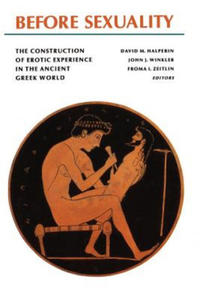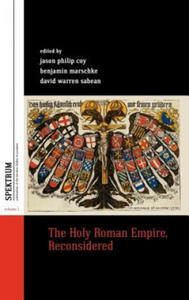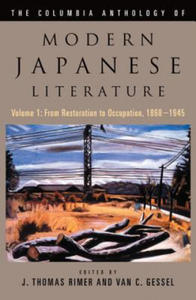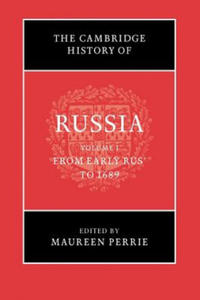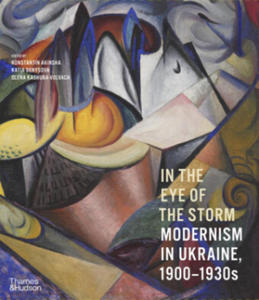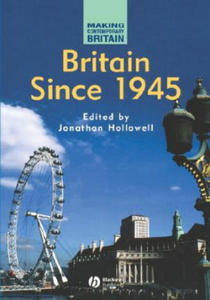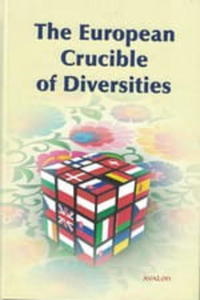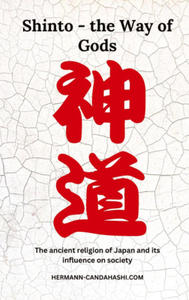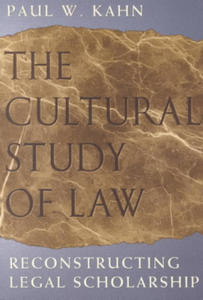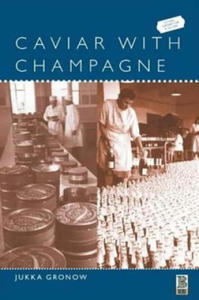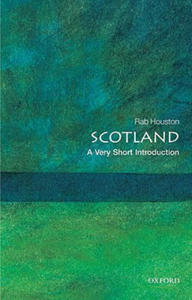krainaksiazek political culture and political development 20106657
- znaleziono 142 produkty w 11 sklepach
Before Sexuality Princeton University Press
Książki / Literatura obcojęzyczna
A dream in which a man has sex with his mother may promise him political or commercial success - according to dream interpreters of late antiquity, who, unlike modern Western analysts, would not necessarily have drawn conclusions from the dream about the dreamer's sexual psychology. Evidence of such shifts in perspective is leading scholars to reconsider in a variety of creative ways the history of sexuality. In these fifteen original essays, eminent cultural historians and classicists not only discuss sex, but demonstrate how norms, practices, and even the very definitions of what counts as sexual activity have varied significantly over time. Ancient Greece offers abundant evidence for a radically different set of sexual standards and behaviors from ours. Sex in ancient Hellenic culture assumed a variety of social and political meanings, whereas the modern development of a sex-centered model of personality now leads us to view sex as the key to understanding the individual.Drawing on both the Anglo-American tradition of cultural anthropology and the French tradition of les sciences humaines, these essays explore the iconography, politics, ethics, poetry, and medical practices that made sex in ancient Greece not a paradise of liberation but an exotic locale hardly recognizable to visitors from the modern world. In addition to the editors, the contributors to this volume are Peter Brown, Anne Carson, Franoise Frontisi-Ducroux, Maud W. Gleason, Ann Ellis Hanson, Franois Lissarrague, Nicole Loraux, Maurice Olender, S.R.F. Price, James Redfield, Giulia Sissa, and Jean-Pierre Vernant.
Sklep: Libristo.pl
Holy Roman Empire, Reconsidered Berghahn Books
Książki / Literatura obcojęzyczna
"Over the last two decades historians have promoted the Holy Roman Empire from a creaking fossil ready for history's ax to a relatively effective government of a decentralized, highly diverse polity. This well-edited volume by a distinguished international corps of specialists offers the most current views on political Germany from around 1500 to around 1800. The perspectives range between two views: the Empire as the forerunner of modern German states; the Empire as an example of a typically premodern political culture. Readers who know only what textbooks say about Germany before 1800, are in for a surprise." * Thomas A. Brady Jr., University of California, Berkeley "Whereas a revised view of the Empire is now part of the historiography in Germany it is not yet widely known among Anglo-American scholars. [O]ne of the important contributions of [this volume] is that it makes some of these revisionist approaches to the Old Empire accessible...I know of no other work that offers such a rich spectrum of approaches to the Old Empire."* Thomas Robisheaux, Duke University Jason Philip Coy is an Associate Professor of History at the College of Charleston, in Charleston, South Carolina. He has received a DAAD Research Grant and a Maria Sibylla Merian Fellowship for Postdoctoral Studies from the University of Erfurt, Germany. He is the author of Strangers and Misfits: Banishment, Social Control, and Authority in Early Modern Germany (2008). Benjamin Marschke is an Associate Professor of History at Humboldt State University in Arcata, California. He has held fellowships from the DAAD, the Fritz Thyssen Stiftung, and the Max Planck Institute for History. He has published Absolutely Pietist: Patronage, Factionalism, and State-Building in the Early Eighteenth-Century Prussian Army Chaplaincy (2005). David Warren Sabean is Henry J. Bruman Professor of German History at the University of California at Los Angeles. He has been the recipient of an Alexander von Humboldt Foundation Research Prize. He is a fellow of the American Academy of Arts and Sciences. His publications include Property, Production, and Family in Neckarhausen, 1700-1870 (1990); Kinship in Neckarhausen, 1700-1870 (1998).He is co-editor with Simon Teuscher and Jon Mathieu of Kinship in Europe: Approaches to Long-Term Development (1300-1900) (2007).
Sklep: Libristo.pl
Columbia Anthology of Modern Japanese Literature Columbia University Press
Książki / Literatura obcojęzyczna
This comprehensive anthology collects works of fiction, poetry, drama, and essay-writing from a pivotal time in Japanese history. In addition to their literary achievements, the texts reflect the political, social, and intellectual changes that occurred in Japanese society during this period, including exposure to Western ideas and literature, the rise of nationalism, and the complex interaction of traditional and modern forces. The volume offers outstanding, often new translations of classic texts by such celebrated writers as Nagai Kafu, Shimazaki Toson, Natsume Soseki, Kawabata Yasunari, and Yosano Akiko. The editors have also unearthed works from lesser-known women writers, many of which have never been available in English. Organized chronologically and by genre within each period, the volume reveals the major influences in the development of modern Japanese literature: the Japanese classics themselves, the example of Chinese poetry, and the encounter with Western literature and culture. Modern Japanese writers reread the classics of Japanese literature, infused them with contemporary language, and refashioned them with an increased emphasis on psychological elements.They also reinterpreted older aesthetic concepts in light of twentieth-century mentalities. While modern ideas captured the imagination of some Japanese writers, the example of classical Chinese poetry remained important for others. Meiji writers continued to compose poetry in classical Chinese and adhere to a Confucian system of thought. Another factor in shaping modern Japanese literature was the example of foreign works, which offered new literary inspiration and opportunities for Japanese readers and writers. Divided into four chapters, the anthology begins with the early modern texts of the 1870s, continues with works written during the years of social change preceding World War I and the innovative writing of the interwar period, and concludes with texts from World War II. Each chapter includes a helpful critical introduction, situating the works within their literary, political, and cultural contexts. Additionally, there are biographical introductions for each writer.
Sklep: Libristo.pl
Cambridge History of Russia: Volume 1, From Early Rus' to 1689 Cambridge University Press
Książki / Literatura obcojęzyczna
This first volume of the Cambridge History of Russia covers the period from early ('Kievan') Rus' to the start of Peter the Great's reign in 1689. It surveys the development of Russia through the Mongol invasions to the expansion of the Muscovite state in the sixteenth and seventeenth centuries and deals with political, social, economic and cultural issues under the Riurikid and early Romanov rulers. The volume is organised on a primarily chronological basis, but a number of general themes are also addressed, including the bases of political legitimacy; law and society; the interactions of Russians and non-Russians; and the relationship of the state with the Orthodox Church. The international team of authors incorporates the latest Russian and Western scholarship and offers an authoritative new account of the formative 'pre-Petrine' period of Russian history, before the process of Europeanisation had made a significant impact on society and culture.
Sklep: Libristo.pl
In the Eye of the Storm Thames & Hudson Ltd
Książki / Literatura obcojęzyczna
A major study of Ukrainian art from 1900 to the mid-1930s - with loans from major museums in Ukraine, elsewhere in Europe, the United States (including MoMA) and Israel. How does artistic life flourish during revolution and conflict? Ukraine in the early 1900s endured unimaginable political upheaval, yet this became a period of true renaissance in Ukrainian art, literature, theatre and cinema. In the Eye of the Storm: Modernism in Ukraine, 1900-1930s presents the ground-breaking art produced in Ukraine in the early 20th century, focusing on the three key cultural centres of Kyiv, Kharkiv and Odesa. Against a complicated socio-political backdrop of collapsing empires, World War I, the revolutions of 1917 with the ensuing Ukrainian War of Independence, and the eventual creation of Soviet Ukraine, several strands of distinctly Ukrainian art emerged. While émigrés such as Sonia Delaunay and Alexander Archipenko found fame outside their homeland, the followers of Mykhailo Boichuk focused on Byzantine revivalism, and the artists of the Kultur Lige sought to promote the development of contemporary Yiddish culture. The first avant-garde exhibitions in Ukraine featured the radical art of Davyd Burliuk and Alexandra Exter, and the dynamic canvases of the Kyiv-based Cubo-Futurist Oleksandr Bohomazov. In Kharkiv, Vasyl Yermilov championed the industrial art of Constructivism, while Vadym Meller, Anatol Petrytskyi, Oleksandr Khvostenko-Khvostov and Borys Kosarev revolutionized theatre design. The attempt to build a national identity in Ukraine resulted in a polyphony of styles and artistic developments across a full range of media - from oil paintings, sketches and sculpture to collages, cinema posters and theatre designs. Twelve internationally renowned scholars, including curators from the National Art Museum of Ukraine, bring to life this astonishing period of creativity in Ukraine and all the movements it encompassed.
Sklep: Libristo.pl
Britain Since 1945 John Wiley and Sons Ltd
Książki / Literatura obcojęzyczna
This book offers a comprehensive overview of Britain's development since the end of the Second World War. Drawing together the themes that have dominated discussion amongst scholars and media commentators, the volume provides a valuable introduction for students of contemporary British history, politics, and society.Britain Since 1945 comprises twenty-three contributions from leading authorities and newer scholars, set in context with a foreword by Raymond Seitz. The chapters are grouped under the thematic headings of government, society, and economy, and address topics such as: foreign policy political parties the media political and economic issues in Scotland, Wales and Northern Ireland race relations women and social change science and information technology culture industrial relations the welfare stateThe book fuses together these key perspectives to provide a rich portrait of Britain in the late 20th century and the changes and developments that have shaped the period.
Sklep: Libristo.pl
EUROPEJSKI TYGIEL ZRÓŻNICOWAŃ MARECKI KUTA WYDAWCA
Kultura i rozrywka > Książki i Komiksy > Książki naukowe i popularnonaukowe > Politologia, stos. międzynarodowe
EUROPEJSKI TYGIEL ZRÓŻNICOWAŃ MARECKI KUTA The cooperation between Central European countries: Czechoslovakia, Poland and Hungary informally referred to as the Visegrad Triangle, and after the split of Czechoslovakia as the Visegrad Four or the Visegrad Group (V4), has its historical and cultural roots in the past centuries. The above countries share common ideas, history, projects and plans for the future built on multiple levels, but also common political and economic past, social relations and finally cultural legacy. In each of these countries Christianity is inextricably linked to the beginnings of the statehood and the development of the national identity. Their close religious relations have for centuries been maintained by the cult of the same heroes, leaders and saints. Over the period of a thousand years political alliances have been established against common enemies. Also, the common experience of Communism is a significant connecting element between these nations. This publication is the outcome of the individual and joint scientific research, meetings, discussion sessions, academic conferences and exchange of thoughts. The authors represent different countries, academic institutions and research teams. Their common goal is to depict the national identity of the countries of the Visegrad Group, show the elements that connect these countries, and expose their common cultural legacy, particularly the traditional culture, as well as the cultural legacy of Europe. Współpraca państw środkowoeuropejskich: Czechosłowacji, Polski i Węgier określanych nieformalnie najpierw jako Trójkąt Wyszehradzki, a po rozpadzie Czechosłowacji, jako Czworokąt Wyszehradzki lub Grupa Wyszehradzka (V4), ma swoje historyczne i kulturowe korzenie w minionych wiekach. Kraje te łączą nie tylko wspólne idee, historia, projekty i plany na przyszłość budowane na kilku płaszczyznach, ale również wspólna przeszłość polityczna, gospodarcza, stosunki społeczne i wreszcie dziedzictwo kulturowe. W każdym z tych krajów chrześcijaństwo wiąże się nierozerwalnie z początkami państwowości i rozwojem tożsamości, a silne związki religijne są podtrzymywane od wieków przez kult tych samych bohaterów, przywódców i świętych. Na przestrzeni tysiąca lat zawiązywano sojusze polityczne przeciwko wspólnym wrogom. Wspólne negatywne doświadczenie komunizmu stanowi ważny element łączący nasze narody. Publikacja jest pokłosiem badań naukowych indywidualnych i zespołowych, spotkań, konwersatoriów, konferencji naukowych, wymiany myśli. Autorzy reprezentują różne kraje, środowiska, placówki naukowe i zespoły badawcze. Wspólnym celem postawionym przez nich było ukazanie tożsamości narodowej krajów Grupy Wyszehradzkiej, pokazanie elementów łączących te cztery kraje, wyeksponowanie wspólnego dziedzictwa kulturowego, ze szczególnym uwzględnieniem kultury tradycyjnej, a także wyeksponowanie dziedzictwa kulturowego Europy.
Sklep: ksiazkitanie.pl
Shinto - The Way of Gods tredition
Książki / Literatura obcojęzyczna
"shinto: the way of the gods - the ancient religion of japan and its influence on society" is a comprehensive examination of the shinto religion and its significance in japanese society. shinto, which literally means "way of the gods," is one of the oldest religions in the world and has a profound influence on japanese culture, history, and identity.in this book, we explore the origins of shintoism and the fundamental principles of this religion.we take a look at the various types of shinto shrines and their significance as places of worship and purification. furthermore, we examine the diverse rituals and ceremonies practiced in shinto and how they shape the spiritual lives of people in japan.another important topic is the connection between shinto and nature. in shintoism, it is believed that nature is inhabited by spirits or gods, and this concept has a strong influence on the understanding and treatment of the environment in japan. we also consider the connection between shinto and japanese mythology, as many of the gods and goddesses of shinto play a role in ancient japanese myths and legends.an additional aspect is the importance of shinto in family life. family rituals and ancestor veneration are integral parts of shinto beliefs and have a significant impact on family relationships in japan.furthermore, we shed light on the influence of shinto on japanese art. whether it is painting, architecture, theater, or music, shintoism has greatly shaped the artistic expressions of japan.additionally, we examine the political history of japan and the influence of shinto on the country's development. particularly during the imperial era, shintoism played a significant role as an instrument of state ideology and as a justification for imperialistic aspirations.throughout the book, we also consider the role of shinto in modern society. how has the faith changed over time, and how is it practiced in contemporary times? we take a look at the influence of shinto on various aspects of modern life, such as education, work ethics, and social norms.a fascinating topic is also the presence of shinto in popular culture. films, anime, and manga often incorporate elements of shinto, contributing to the spread and popularity of the religion. we examine some well-known examples and explore their impact on the international perception of shinto.tourism also plays a significant role in relation to shinto. many tourists from around the world visit japan to experience the impressive shinto shrines and participate in traditional ceremonies. we analyze the impact of tourism on shinto sites and the challenges they face.furthermore, we consider interreligious dialogue and how shinto interacts with other religions in japan. there is a long history of coexistence and exchange between shinto, buddhism, and other religious traditions in japan, and we delve into these relationships in more detail.lastly, we take a glimpse into the future of shinto. how will the religion evolve and withstand modern challenges and societal changes? what opportunities and potentials does shinto offer for shaping japan's future?"shinto: the way of the gods - the ancient religion of japan and its influence on society" provides a comprehensive and captivating exploration of shintoism and its influence on japanese society. it is intended for readers interested in religion, culture, history, and japanese society, offering deep insights into one of the most fascinating and influential religions in the world. immerse yourself in the world of shinto and discover its diverse facets and impact on japanese culture and identity.
Sklep: Libristo.pl
Cultural Study of Law The University of Chicago Press
Książki / Literatura obcojęzyczna
Belief in the rule of law characterizes our society, our political order, and even our identity as citizens. Yet despite the importance of this phenomenon, those who study culture have failed to focus on the law. In this work, Paul Kahn provides a full examination of what it means to conduct a modern intellectual inquiry into the culture of law. He explains the shortcomings of current legal scholarship and, more important, charts the way for the development of an entirely new intellectual discipline of law, one that approaches law as a way of life rather than a set of rules. Kahn argues that legal scholars, despite the appearance of some sophisticated theory in modern legal scholarship, are bound to the idea of improving the law through reform. The state of current legal scholarship can be compared to the study of religion around the turn of the century, when it was a part of the practice of religion and not a distinct intellectual discipline as it is today. To conduct a genuine study of our legal culture, we must step outside the boundaries of our legal system, abandon the ambition of reform, and instead interpret the beliefs and practices that constitute the rule of law.Kahn outlines the conceptual tools and methodology necessary for such an inquiry. Drawing on modern cultural studies, he analyzes the concepts of time, space, citizen, judge, sovereignty, and theory within the culture of the rule of law.
Sklep: Libristo.pl
Caviar with Champagne Bloomsbury Publishing
Książki / Literatura obcojęzyczna
'Life has become more joyous, comrades.' Josef Stalin, 1936Stalin's Russia is best known for its political repression, forced collectivization and general poverty. Caviar with Champagne presents an altogether different aspect of Stalin's rule that has never been fully analyzed - the creation of a luxury goods society. At the same time as millions were queuing for bread and starving, drastic changes took place in the cultural and economic policy of the country, which had important consequences for the development of Soviet material culture and the promotion of its ideals of consumption.The 1930s witnessed the first serious attempt to create a genuinely Soviet commercial culture that would rival the West. Government ministers took exploratory trips to America to learn about everything from fast food hamburgers to men's suits in Macy's. The government made intricate plans to produce high-quality luxury goods en masse, such as chocolate, caviar, perfume, liquor and assorted novelties. Perhaps the best symbol of this new cultural order was Soviet Champagne, which launched in 1936 with plans to produce millions of bottles by the end of the decade.Drawing on previously neglected archival material, Jukka Gronow examines how such new pleasures were advertised and enjoyed. He interprets Soviet-styled luxury goods as a form of kitsch and examines the ideological underpinnings behind their production.This new attitude toward consumption was accompanied by the promotion of new manners of everyday life. The process was not without serious ideological contradictions. Ironically, a factory worker living in the United States - the largest capitalist society in the world - would have been hard-pressed to afford caviar or champagne for a special occasion in the 1930s, but a Soviet worker theoretically could (assuming supplies were in stock). The Soviet example is unique since the luxury culture had to be created entirely from scratch, and the process was taken extremely serio
Sklep: Libristo.pl
Caviar with Champagne Bloomsbury Publishing
Książki / Literatura obcojęzyczna
'Life has become more joyous, comrades.' Josef Stalin, 1936Stalin's Russia is best known for its political repression, forced collectivization and general poverty. Caviar with Champagne presents an altogether different aspect of Stalin's rule that has never been fully analyzed - the creation of a luxury goods society. At the same time as millions were queuing for bread and starving, drastic changes took place in the cultural and economic policy of the country, which had important consequences for the development of Soviet material culture and the promotion of its ideals of consumption.The 1930s witnessed the first serious attempt to create a genuinely Soviet commercial culture that would rival the West. Government ministers took exploratory trips to America to learn about everything from fast food hamburgers to men's suits in Macy's. The government made intricate plans to produce high-quality luxury goods en masse, such as chocolate, caviar, perfume, liquor and assorted novelties. Perhaps the best symbol of this new cultural order was Soviet Champagne, which launched in 1936 with plans to produce millions of bottles by the end of the decade.Drawing on previously neglected archival material, Jukka Gronow examines how such new pleasures were advertised and enjoyed. He interprets Soviet-styled luxury goods as a form of kitsch and examines the ideological underpinnings behind their production.This new attitude toward consumption was accompanied by the promotion of new manners of everyday life. The process was not without serious ideological contradictions. Ironically, a factory worker living in the United States - the largest capitalist society in the world - would have been hard-pressed to afford caviar or champagne for a special occasion in the 1930s, but a Soviet worker theoretically could (assuming supplies were in stock). The Soviet example is unique since the luxury culture had to be created entirely from scratch, and the process was taken extremely serio
Sklep: Libristo.pl
Stosunki MiÄdzynarodowe 52 2/2016 SCHOLAR
Czasopisma i periodyki / Czasopisma
W numerze [Contents] STUDIA [STUDIES] Irena Popiuk-RysiĹska: Od orÄdzia Roosevelta do CelĂłw ZrĂłwnowaĹźonego Rozwoju 2030. Kwestia rozwoju na forum NarodĂłw Zjednoczonych [From Rooseveltâs Address to the 2030 Sustainable Development Goals. The Issue of Development in the United Nations], doi 10.7366/020909611201601, s. 9â36; StanisĹaw BieleĹ: NATO â czas przewartoĹciowaĹ [NATO â A Time of Redefinitions], doi 10.7366/020909611201602, s. 37â50; StanisĹaw Parzymies: Francja w stosunkach miÄdzynarodowych. Mocarstwo europejskie czy globalne? [France in International Relations. A European or Global Power?], doi 10.7366/020909611201603, s. 51â74; GraĹźyna MichaĹowska: Sytuacja dzieci w Chinach w Ĺwietle standardĂłw miÄdzynarodowych [The Situation of Children in China in Light of International Standards], doi 10.7366/020909611201604, s. 75â92; Natalia Kohtamäki: Europejska agencja nadzoru bankowego w systemie bezpieczeĹstwa finansowego Unii Europejskiej [The European Banking Authority in the EU Financial Security System], doi 10.7366/020909611201605, s. 93â108; Tomasz Grzegorz Grosse: Geopolityczne strategie paĹstw mniejszych i peryferyjnych â przykĹad Polski w Unii Europejskiej [Geopolitical Strategies of Minor and Peripheral States: The Example of Poland in the European Union], doi 10.7366/020909611201606, s. 109â132; Agnieszka Szpak: Status âmaĹych zielonych ludzikĂłwâ w konflikcie zbrojnym na Ukrainie [The Status of âLittle Green Menâ in the Armed Conflict in Ukraine], doi 10.7366/020909611201607, s. 133â152; Agata Kleczkowska: Palestyna â paĹstwo nieuznawane [Palestine â An Unrecognised State], doi 10.7366/020909611201608, s. 153â176; Serge Sur: La Charte des Nations Unies interdit-elle le recours Ă la force armĂŠe? [Does the Charter of the United Nations Prohibit the Use of Armed Force?], doi 10.7366/020909611201609, s. 177â188; Katarzyna Czornik: Hard power a soft power w polityce zagranicznej Arabii Saudyjskiej w drugiej dekadzie XXI wieku. Casus Bahrajnu i Jemenu [Hard and Soft Power in Saudi Arabiaâs Foreign Policy in the Second Half of the 21st Century. The Case of Bahrain and Yemen], doi 10.7366/020909611201610, s. 189â210; Marek Rewizorski: BRICS in the G20? The Involvement of Rising Powers in the Premier Forum of Global Governance, doi 10.7366/020909611201611, s. 211â222; Bartosz Konrad Jankowski: ChiĹska Republika Ludowa jako wschodzÄ cy donator pomocy rozwojowej [The Peopleâs Republic of China as an Emerging Donor of Development Assistance], doi 10.7366/020909611201612, s. 223â246; Karolina ZieliĹska: Relacje z krajami Afryki Subsaharyjskiej a sytuacja miÄdzynarodowa Izraela w latach 1956â1973 [Sub-Saharan Africa in Israelâs Foreign Policy 1956â1973], doi 10.7366/020909611201613, s. 247â270; Ä°pek Aynuksa: Ali UfkĂŽ Bey (Wojciech Bobowski) â Well-Known Musician, Forgotten Political Figure. A Luminary in the 600 Years of TurkishâPolish Diplomatic Relations, doi 10.7366/020909611201614, s. 271â284; Hanna Schreiber: Metoda etnograficzna w badaniu stosunkĂłw miÄdzynarodowych â uwagi wstÄpne [The Ethnographic Method as a Research Method in International Relations â Preliminary Remarks], doi 10.7366/020909611201615, s. 285â302; Oskar Pietrewicz: Korea PĂłĹnocna w dyskursie akademicko-eksperckim w Chinach [North Korea in the Academic and Expert Discourse in China], doi 10.7366/020909611201616, s. 303â321. SPRAWOZDANIA [REPORTS] Weronika Garbacz, Anna Pochylska, Anna Walkowiak: Sprawozdanie z Konferencji â70 lat Organizacji NarodĂłw Zjednoczonych: Silna ONZ. Lepszy Ĺwiatâ â 3 listopada 2015 roku [Report on the Conference on 70 years of the United Nations âA Stronger UN. A Better Worldâ â 3 November 2015], s. 323â348. RECENZJE [REVIEWS] Roman KuĹşniar: Irena Popiuk-RysiĹska, Ewolucja systemu zbiorowego bezpieczeĹstwa NarodĂłw Zjednoczonych po zimnej wojnie [The Evolution of the UNâs Collective Security System after the Cold War], s. 349â354; Diana Stelowska-Morgulec: GraĹźyna MichaĹowska, Hanna Schreiber (red.), Kultura w stosunkach miÄdzynarodowych. Tom 1: Zwrot kulturowy [[Culture in International Relations. Volume I: Cultural Turn], s. 355â358; Iwona Wyciechowska: Anna PotyraĹa, Organizacja NarodĂłw Zjednoczonych wobec problemu uchodĹşstwa. Geneza, istota i praktyka aktywnoĹci [The United Nations and the Refugee Problem. Genesis, Essence and Practice], s. 359â364; Hanna Schreiber: Jacek Czaputowicz (red.), Studia europejskie. Wyzwania interdyscyplinarnoĹci [European Studies. The Challenges of Interdisciplinarity], s. 365â372; Jan RowiĹski, RafaĹ TuszyĹski: Ewa Trojnar (red.), The Taiwan Issues, s. 373â376; Karina JÄdrzejowska: Bartosz Jankowski, UdziaĹ Polski w miÄdzynarodowej wspĂłĹpracy na rzecz rozwoju [Polandâs Involvement in International Development Cooperation], s. 377â381; Wojciech Kostecki: Anna Wojciuk, Imperia wiedzy: edukacja i nauka jako czynniki siĹy paĹstw na arenie miÄdzynarodowej [Empires of Knowledge: Education and Science as Factors of State Power in the International Arena], s. 381â385.
Sklep: Literacka.pl
From Athens to Auschwitz Harvard University Press
Inne 1
What does history mean today? What is its relevance to the modern world? In contemplating fundamental questions about history and the Western legacy, the noted classical historian Christian Meier offers a new interpretation on how we view the world. Meier sees an "absence" of history in contemporary Europe and throughout the West--an absence he attributes to the way modern historians have written about history and, more important, to the dramatic transformations of the twentieth century. He argues for the central legacy of Western civilization. He tackles the difficulty of reconciling a historical perspective with our era of extreme acceleration, when experience is shaped less by inheritance and legacy than by the novelty of changes wrought by science and globalization. Finally, Meier contemplates the enormity of the Holocaust, which he sees as a test of "understanding" history. If it is part of the whole arc of the Western legacy, how do we fit it with the rest? This engaging and thought-provoking meditation challenges us to rethink the role of history in Western culture and a changing world. Christian Meier, a prolific historian of the ancient world, here delivers a series of lectures on the perennial topic summed up in his subtitle...The two most rewarding chapters are the most specific, about the sources of the intellectual and artistic splendor that was classical Greece and the conditions of the equally incomparable horror that was the Holocaust. An America darkened by ignorant and bigoted religiosity cannot hear too often about the gloriously open-minded rationalists who launched Western civilization in fifth-century BC Athens. Meier draws on a lifetime of scholarship to put the miracle in context. And with proper tact and humility, he looks at his own country's all-too-recent shame, hoping to put it too in context. For that is what historians do; that is the use of history. --George Scialabba, Boston GlobeDuring the 20th century, Europe was reduced from its position of world dominance by a series of wars and political upheavals. According to Meier, Europeans lost more than its preeminence. In a series of six lectures covering topics from ancient Athens to Auschwitz, Meier argues that contemporary European society has lost its historical self-awareness, which presents a major problem as Europeans consider the expansion of the European Union (EU). Meier argues that the EU is the 'first political entity of the modern era that has no need for its own history and for a historical orientation.' One of the symptoms of this malady, Meier believes, is that it is not clear what kind of future Europe envisions for itself. Meier argues that one ingredient needed to correct this drift is the development of a Eurocentric history, distinct from previous ethnocentric notions, which acknowledges the uniqueness of what he refers to as the 'European miracle' and its impact on world history. --Frederic Krome, Library Journaln discussing Auschwitz, Meier argues that it must be understood as part of history, not as an inexplicable and unfathomable event, and that history is not the record of inevitable progress, at least not moral progress. --Eugene Larson, Christian Meier has written a challenging, provocative, and timely book. It is a pleasure to observe this eminent ancient historian think through and struggle with the grand questions of European and Western history. --Michael E. Geyer, University of ChicagoA daring book, wise and unpedantically learned. Meier's main concern is with Europe's 'special path,' how and why its civilization (and that of its offspring, the United States) came to dominate the world, beginning in the fifteenth century. He analyzes the elements shaping the historic process and reflects searchingly on why in some symbolic but not precise sense Auschwitz marks the end of the special path. The spirit of Jacob Burckhardt pervades this suggestive historical and philosophical meditation. --Fritz Stern, Columbia University,Emeritus
Sklep: Albertus.pl
Zen and the Way of the Sword Oxford University Press Inc
Książki / Literatura obcojęzyczna
Zen--serene, contemplative, a discipline of meditation associated with painting, rock gardens, and flower arranging--seems an odd ingredient in the martial psyche of the Japanese samurai. "One who is a samurai must before all things keep constantly in mind...the fact that he has to die," wrote a seventeenth-century warrior. "That is his chief business." But the demands of that "business," writes Winston King, found the perfect philosophical match in the teachings of Zen Buddhism. In Zen and the Way of the Sword, King offers a fascinating look into the mind of the samurai swordsman in a far-reaching account of the role of Zen in the thought, culture, and the martial arts of Japan's soldier elite. An esteemed scholar of Eastern religions, King deftly traces the development of Zen and discusses the personal nature of its practice, its emphasis on individual discovery and attainment. He then presents an accomplished capsule history of the samurai class, from its rise in the middle ages to formal abolition in the nineteenth century--an account filled with details of wars, political maneuvering, and cultural achievements.King also looks at the arms and vocation of the individual samurai, placing the details of armor and weapons in the context of the samurai conception of warfare. In particular, King focuses on the sword--the soul of the samurai, as it was called--describing how it was forged, the honor given famous swordsmiths, the rise of schools of swordsmanship, and breathtaking feats of the great swordsmen. Throughout, King shows how the samurai cultivated Zen, relating its teaching of a free and spontaneous mind to the experience of a warrior in individual combat, and finding philosophical strength in Zen as they prepared themselves for death. "What mind can penetrate his opponent's mind?" one authority has written. "It is a mind that has been trained and cultivated to the point of detachment with perfect freedom...His mind should reflect his opponent's mind like water reflecting the moon." In other words, a mind trained by Zen. King goes on to trace the role of Zen in samurai life through the peaceful eighteenth and nineteenth centuries, examining the absorption of Zen into World War II psychology and broader Japanese culture.Throughout, he provides a thoughtful perspective, both sympathetic and aware of the ethical problems inherent in a school of Buddhism turned to the needs of a military class. A scholarly, absorbing account, Zen and the Way of the Sword provides fascinating insight into the samurai ethos, and the culture of Japan today.
Sklep: Libristo.pl
Scotland: A Very Short Introduction Oxford University Press
Książki / Literatura obcojęzyczna
Since Devolution in 1999 Scotland has become a focus of intense interest both within Britain and throughout the wider world. In this Very Short Introduction, Rab Houston explores how an independent Scottish nation emerged in the Middle Ages, how it was irrevocably altered by Reformation, links with England and economic change, and how Scotland influenced the development of the modern world. Examining politics, law, society, religion, education, migration, and culture, he examines how the nation's history has made it distinct from England, both before and after Union, how it overcame internal tensions between Highland and Lowland society, and how it has today arrived at a political, social and culture watershed. Authoritative, lucid, and ranging widely over issues of environment, people, and identity, this is Scotland's story without myths: an ideal introduction for those interested in the Scots, but also a balanced yet refreshing challenge to those who already feel at home in Scotland past and present. ABOUT THE SERIES: The Very Short Introductions series from Oxford University Press contains hundreds of titles in almost every subject area.These pocket-sized books are the perfect way to get ahead in a new subject quickly. Our expert authors combine facts, analysis, perspective, new ideas, and enthusiasm to make interesting and challenging topics highly readable.
Sklep: Libristo.pl
szukaj w Kangoo krainaksiazek political culture and political development 20106657
Sklepy zlokalizowane w miastach: Warszawa, Kraków, Łódź, Wrocław, Poznań, Gdańsk, Szczecin, Bydgoszcz, Lublin, Katowice
Szukaj w sklepach lub całym serwisie
1. Sklepy z krainaksiazek political culture and political development 20106657
2. Szukaj na wszystkich stronach serwisu
t1=0.036, t2=0, t3=0, t4=0.013, t=0.036

